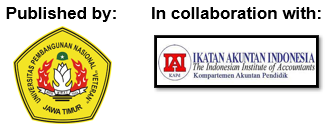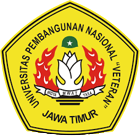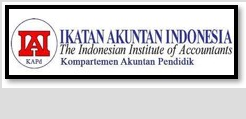Critical Review of XBRL Financial Reporting: Perspective Pancasila as One of Indonesia’s National Defense Values
DOI:
https://doi.org/10.33005/jasf.v7i1.511Keywords:
Indonesia national defense value, integrity, Pancasila, XBRL Financial ReportingAbstract
Implementing XBRL (eXtensible Business Reporting Language) reporting, which has been mandatory since 2015, has been a significant development in Indonesia. However, as a concept adopted from developed countries, XBRL may not fully align with Indonesia's national defense values of Pancasila. This research critically reviews the implementation of XBRL financial reporting, emphasizing its alignment with Pancasila as one of the Indonesian national defense values. This study focuses on the implementation, challenges, and impact of XBRL financial reporting. To further understand the relationship between Pancasila and XBRL, this study uses case studies on three government banks, the pioneers in implementing XBRL financial reporting. The critical analysis, particularly from the perspective of Pancasila values, demonstrates that XBRL can enhance the integrity, standardization, transparency, comparability, and public trust in companies, thereby positively impacting long-term performance. These findings not only provide a crucial basis for further research but also offer practical implications for companies to immediately implement XBRL, aligning with the Pancasila as the noble values of the Indonesian nation.
Downloads
References
Afifah, R., & Fadilah, N. R. (2023). Implementation of Pancasila Values in Students in Everyday Life. The East Journal Law and Human Rights, 1(02), 51–57. https://doi.org/10.58812/eslhr.v1i02.55
Agung, S. L. (2021). Pancasila Values as Strengthening Character Building during the Covid -19 Pandemic. Social, Humanities, and Educational Studies (SHEs): Conference Series, 4(4), 63–69. https://doi.org/10.20961/shes.v4i4.50587
Agussalim, A., Hartoyo, H., & Wahyuni, W. (2023). Pancasila Economy: Study Theory and Implementation in Economic Education in Indonesia. Eklektik : Jurnal Pendidikan Ekonomi dan Kewirausahaan, 5(2), 180–190. https://doi.org/10.24014/ekl.v5i2.20832
Aini, N. Q., & Dewi, D. A. (2022). Sistem Etika Pancasila dalam Kehidupan Berbangsa dan Bernegara. Jurnal Pendidikan Tambusai, 6(2), 11120–11125. https://jptam.org/index.php/jptam/article/download/4200/3513/7985
Aksoy, M., Yilmaz, M. K., Topcu, N., & Uysal, Ö. (2021). The impact of ownership structure, board attributes and XBRL mandate on timeliness of financial reporting: evidence from Turkey. Journal of Applied Accounting Research, 22(4), 706–731. https://doi.org/https://doi.org/10.1108/JAAR-07-2020-0127
Al Dulaimi, J. A. A. B., & Kadhim, E. H. (2022). Transparency of information in the financial statements and the extent to which it discloses the future expectations of economic units using the Tobin’s Q index. In International Journal of Professional Business Review (Vol. 7, Issue 5, pp. 19-e0766). Universidade da Coruña. https://doi.org/10.26668/businessreview/2022.v7i5.766
Ali, M., & Huda, N. (2022). Pancasila economic concepts in Shari’ah economic perspective. LISAN AL-HAL: Jurnal Pengembangan Pemikiran dan Kebudayaan, 16(2), 255–272. https://doi.org/10.35316/lisanalhal.v16i2.255-272
Anggistya, D. K., & Abdillah, A. A. M. P. (2023). Negara Hukum Pancasila dalam Konsepsi Prismatik. Jurnal Hukum dan Sosial Politik, 1(1), 48–60. https://doi.org/10.59581/jhsp-widyakarya.v1i1.236
Ansary, M. El, Oubrich, M., Orlando, B., & Fiano, F. (2020). The determinants of XBRL adoption: a meta-analysis. International Journal of Managerial and Financial Accounting, 12(1), 1. https://doi.org/10.1504/IJMFA.2020.106999
Azhari, T. M. A. R. A., & Rosyad, S. (2023). Moral Education and Pancasila as the Ideology for the Country of Indonesia. International Journal of Research and Innovation in Social Science, VII(VI), 315–320. https://doi.org/10.47772/ijriss.2023.7624
Bararoh, T., Hendrawati, E., & Pramudianti, M. (2019). Portrait of Accounting Based on Pancasila Values. International Conference on Innovation in Research (ICIIR 2018)–Section: Economics and Management Science, 204–208. https://doi.org/10.2991/iciir-18.2019.39
Baroto, W. S. (2022). Financial Report Analysis of the Jeneponto Regency Regional Government for 2021. Current Advanced Research on Sharia Finance and Economics Worldwide, 2(1), 259–266. https://doi.org/10.55047/cashflow.v2i1.496
BEI. (2014). Mengenai XBRL. Bursa Efek Indonesia. https://www.idx.co.id/id/perusahaan-tercatat/xbrl
BEI. (2019). Towards the Journey of EXCELLENCE. https://www.idx.co.id/media/7355/2018.pdf
Bo’a, F. Y. (2018). Pancasila sebagai Sumber Hukum dalam Sistem Hukum Nasional. Jurnal Konstitusi, 15(1), 21–49. https://doi.org/10.31078/jk1512
Board, I. A. S. (2010). International Financial Reporting Standards (IFRSs). Kluwer.
Budai, E., & Denich, E. (2022). Financial reports quality from the students perspective. Acta Academiae Beregsasiensis. Economics, 2, 220–231. https://doi.org/10.58423/2786-6742/2022-2-220-231
Dahurandi, K., & Nase, V. (2023). Analisis Integrasi Nilai Pancasila dalam Budaya Manggarai. Jurnal Alternatif Wacana Ilmiah Interkultural, 11(2), 72–84. https://doi.org/10.60130/ja.v11i2.112
Debreceny, R. S., Farewell, S. M., Piechocki, M., Felden, C., Gräning, A., & D’Eri, A. (2011). Flex or Break? Extensions in XBRL Disclosures to the SEC. Accounting Horizons, 25(4), 631–657. https://doi.org/10.2308/acch-50068
Famauri, A. T. (2019). The values of Pancasila in electronic banking agreement. Hasanuddin Law Review, 5(3), 289–298. https://doi.org/10.20956/halrev.v5i3.2150
Fatayati, S., & Mahardika, A. G. (2021). Reposisi Pancasila dari Norm Menjadi Values sebagai Integrasi Pancasila dan Islam. Tribakti: Jurnal Pemikiran Keislaman, 32(1), 1–16. https://doi.org/10.33367/tribakti.v32i1.1404
Frindiyani, V., Naehu, A. M., & Rosidah, R. (2023). Filsafat Pancasila sebagai Pedoman Hidup Bangsa Indonesia. Pro Patria: Jurnal Pendidikan, Kewarganegaraan, Hukum, Sosial, Dan Politik, 6(1), 67–76. https://doi.org/10.47080/propatria.v6i1.2504
Hoitash, R., Hoitash, U., & Morris, L. (2021). eXtensible Business Reporting Language (XBRL): A Review and Implications for Future Research. Auditing: A Journal of Practice & Theory, 40(2), 107–132. https://doi.org/10.2308/AJPT-2019-517
Hwang, S., No, W. G., & Kim, J. (2020). XBRL Mandate and Timeliness of Financial Reporting: The Effect of Internal Control Problems. Journal of Accounting, Auditing & Finance, 36(3), 1–23. https://doi.org/https://journals.sagepub.com/doi/10.1177/0148558X20929854
Jayanti, M., & Sowiyah, S. (2023). Implementation of Pancasila Ideology in Indonesian Educational Leadership: A Literature Review. International Journal of Current Science Research and Review, 06(06), 846–852. https://doi.org/10.47191/ijcsrr/v6-i6-08
Karimullah, S. S. (2023). Actualization of Pancasila as an Integrative Paradigm in Forming Imagination and Creativity. Pancasila: Jurnal Keindonesiaan, 3(1), 11–21. https://doi.org/10.52738/pjk.v3i1.141
Kurniawan, E. K., Wilsen, V., Valencia, S., & Azizah, Q. (2023). Implementation of Pancasila Ideology in Modern Society. Jurnal Pendidikan Amartha, 1(2), 91–98. https://doi.org/10.57235/jpa.v1i2.125
Li, X., Zhu, H., & Zuo, L. (2021). Reporting Technologies and Textual Readability: Evidence from the XBRL Mandate. Information Systems Research, 32(3), 675–1097. https://doi.org/https://doi.org/10.1287/isre.2021.1012
Liu, C., Luo, X. (Robert), & Wang, F. L. (2017). An empirical investigation on the impact of XBRL adoption on information asymmetry: Evidence from Europe. Decision Support Systems, 93, 42–50. https://doi.org/10.1016/j.dss.2016.09.004
Lukitoyo, P. S., Sembiring, N. B., & Kurniawan, R. (2023). Implementation of the Pancasila Values Towards Implementation of the Merdeka Curriculum in Indonesian Education System. JUPIIS: Jurnal Pendidikan Ilmu-Ilmu Sosial, 15(1), 22–31. https://doi.org/10.24114/jupiis.v15i1.44321
Maulida, S. Z., Xavier, M., & Elliot, M. (2023). The Essence of Pancasila as the Foundation and Ideology of the State: The Values of Pancasila. International Journal of Educational Narratives, 1(2), 84–92. https://doi.org/10.55849/ijen.v1i2.303
Mediawati, E. (2016). Internal Control and Quality of Financial Reporting in Zakat Management Organization. Advances in Economics, Business and Management Research, 17–19. https://doi.org/10.2991/gcbme-16.2016.3
Mulyaningrum, C. W., Pratama, I. B., Oktavia, N. R., & Fitriono, R. A. (2022). Aktualisasi Nilai-Nilai Pancasila dalam Kehidupan Berbangsa dan Bernegara di Era Generasi Milenial. Gema Keadilan, 9(3), 208–219. https://doi.org/10.14710/gk.2022.16482
Nugroho, D. A., & Anwar, W. Y. C. (2022). Strategy to empower Pancasila values through podcast media as digital citizens innovation. Jurnal Civics: Media Kajian Kewarganegaraan, 19(2), 245–254. https://doi.org/10.21831/jc.v19i2.53562
Nuryanah, S., Siregar, S. V. N. P., Arifin, I., & Sofyan, L. (2024). Taxpayers’ perceptions of a new digital tax return feature: a case study in Indonesia. International Journal of EBusiness and EGovernment Studies, 16(1), 26–35. https://doi.org/https://orcid.org/0000-0002-5836-3870
Oktarina, S., Budianto, A., & Sara, R. (2023). Implementation of Pancasila Value in Criminal Law Renewal. Proceedings of the 2nd Multidisciplinary International Conference, MIC 2022, 12 November 2022, Semarang, Central Java, Indonesia, 1–8. https://doi.org/10.4108/eai.12-11-2022.2327294
Prekazi, Y. (2022). Transparency of Financial Reports of Companies in the Republic of Kosovo. Prizen Social Science Journal, 6(1), 95–100. https://doi.org/10.32936/pssj.v6i1.318
Putra, C. G. B., Sumadi, N. K., & Muliati, N. K. (2022). The Value of Pancasila in Foundation Financial Accountability Practices. International Journal of Interreligious and Intercultural Studies, 5(1), 59–73. https://doi.org/10.32795/ijiis.vol5.iss1.2022.2850
Putri, A. L., & Dewi, D. A. (2022). Nilai-Nilai Pancasila sebagai Pandangan Hidup dan Pembentuk Karakter Bangsa. Jurnal Pendidikan Sosiologi dan Humaniora, 13(2), 438–442. https://doi.org/10.26418/j-psh.v13i2.54788
Reid, A., Ringel, E., & Pendleton, S. M. (2024). Transparency reports as CSR reports: motives, stakeholders, and strategies. Social Responsibility Journal, 20(1), 81–107. https://doi.org/10.1108/SRJ-03-2023-0134
Sabry, S. S. & Hussein, A. I. (2023). The modified role of the company’s characteristics in the relationship of accounting disclosure transparency with the restatement of financial statements: Evidence from Iraq. Journal of Namibian Studies: History Politics Culture, 33, 2192–2214. https://doi.org/10.59670/jns.v33i.839
Salampessy, Z., Triyuwono, I., Irianto, G., & Hariadi, B. (2018). Pancasila paradigm: Methodology of wawasan nusantara for accounting of pancasila. Australasian Accounting, Business and Finance Journal, 12(1), 102–117. https://doi.org/10.14453/aabfj.v12i1.7
Sanad, Z., & Al-Sartawi, A. (2023). A Broader Perspective on eXtensible Business Reporting Language (XBRL) in Earnings Management Research. In From the Internet of Things to the Internet of Ideas: The Role of Artificial Intelligence (EAMMIS 2022) (pp. 435–446). https://doi.org/10.1007/978-3-031-17746-0_35
Scott, W. R. (2015). Financial Accounting Theory, 7/E (Seventh Ed). Pearson.
Shanti, Y. K., Kusumawardhany, S. S., & Sudarmadi, S. (2023). Understanding accounting in supporting reports quality finance at PT. Pasanggrahan Citra Persada: Pemahaman akuntansi dalam mendukung laporan keuangan berkualitas pada PT. Pasanggrahan Citra Persada. Puan Indonesia, 4(2), 287–300. https://doi.org/10.37296/jpi.v4i2.120
Singh, H., & Singh, A. (2022). Understanding inhibitors to XBRL adoption: an empirical investigation. Accounting Research Journal, 35(5), 598–615. https://doi.org/https://doi.org/10.1108/ARJ-05-2021-0144
Sintara, D., & Suhaidi, S. (2019). Social Justice Value of Pancasila in Local Finance Accountability for Economic Growth. The 1st Workshop on Multimedia Education, Learning, Assessment and Its Implementation in Game and Gamification in Conjunction with COMDEV 2018, Medan Indonesia, 26th January 2019, WOMELA-GG, 1–4. https://doi.org/10.4108/eai.26-1-2019.2283208
Siska Marlina, S. M. (2022). Implementasi Nilai Keadilan dalam Pancasila Guna Membangun Karakter dan Etika Pendidik di Perguruan Tinggi. Berdikari: Jurnal Pengabdian Masyarakat Indonesia, 4(2), 35–43. https://doi.org/10.11594/bjpmi.04.02.01
Snyder, H. (2019), Literature review as a research methodology: An overview and guidelines, Journal of Business Research, Volume 104, 2019, 333-339. https://doi.org/10.1016/j.jbusres.2019.07.039.
Sopia, D. A., Avrilla, M., & Sya’bani, R. A. (2023). Pentingnya Implementasi Nilai Pancasila Sila Kesatu dalam Menumbuhkan Karakter Siswa Sekolah Dasar–Analisis Studi Pustaka. Didaktik : Jurnal Ilmiah PGSD STKIP Subang, 9(2), 5792–5800. https://doi.org/10.36989/didaktik.v9i2.1373
Sri, S. W. (2022). Sistem Informasi Akuntansi Keuangan untuk Menganalisa Kesehatan Perusahaan Berbasis Web. Kompak :Jurnal Ilmiah Komputerisasi Akuntansi, 15(2), 501–511. https://doi.org/10.51903/kompak.v15i2.892
Sudaryanti, D., Sukoharsono, E. G., Baridwan, Z., & Mulawarman, A. D. (2015). Critical Analysis on Accounting Information Based on Pancasila Value. Procedia - Social and Behavioral Sciences, 172, 533–539. https://doi.org/10.1016/j.sbspro.2015.01.399
Sugiarto, T., & Asnawi, N. (2023). The Challenges of Pancasila Socio-Democracy in the Era of Networked Society: Liberal Democracy and Religious Fundamentalism. El Madani: Jurnal Dakwah dan Komunikasi Islam, 4(01), 59–82. https://doi.org/10.53678/elmadani.v4i01.1193
Sutrisno, E., & Prayitno, A. (2023). Legal Essence of Pancasila as the Basis of the Reality of Indonesian Life: To Improve the Welfare of the Fishing Community. Russian Law Journal, 11(9s), 290–296. https://doi.org/10.52783/rlj.v11i9s.1598
Tawiah, V., & Borgi, H. (2022). Impact of XBRL adoption on financial reporting quality: a global evidence. Accounting Research Journal, 35(6), 815–833. https://doi.org/10.1108/ARJ-01-2022-0002
Tentero, R. (2023). Pancasila Revitalization for the Enforcement of Non-Discriminatory Principle of Global Business Competition to Small Entrepreneurs. KnE Social Sciences, 299–310. https://doi.org/10.18502/kss.v8i3.12836
Wahhab, A., Al Fattehallah, M. A. A. M. A., & Alsujair, M. H. A. (2022). Transparency of Financial Reporting According to the S&P500 Indices and its Implications for Accounting Information Risks - Evidence from the Iraq Stock Exchange. Technium Business and Management, 2(3), 140–158. https://doi.org/10.47577/business.v2i3.8067
Wandani, A. R., & Dewi, D. A. (2021). Penerapan Pancasila sebagai Dasar Kehidupan Bermasyarakat. De Cive : Jurnal Penelitian Pendidikan Pancasila dan Kewarganegaraan, 1(2), 34–39. https://doi.org/10.56393/decive.v1i2.225
Wen Lee, C.-, & Ande, T. (2022). Pancasila Has the Ability to Improve Community, Nation, and State Life in the Twenty-First Century. Journal Research of Social Science, Economics, and Management, 1(8), 1041–1047. https://doi.org/10.59141/jrssem.v1i8.120
Widyorini, S. R., & Yasminingrum, Y. (2023). The Values of Pancasila as the First Reforming the Law. International Journal of Social Science and Human Research, 06(06), 3888–3892. https://doi.org/10.47191/ijsshr/v6-i6-85
Wijaya, A. U., & Ayumeida Kusnadi, S. (2023). Pancasila Philosophical Values as the Regulation Basis of Intellectual Property Rights in Indonesia. KnE Social Sciences, 490–498. https://doi.org/10.18502/kss.v8i4.12935
Wijaya, D., & Suryaningrum, D. (2021). The Extensible Business Reporting Language and Fraudulent Financial Statement in Indonesia. Proceedings of the 1st MICOSS Mercu Buana International Conference on Social Sciences, MICOSS 2020, September 28-29, 2020, Jakarta, Indonesia, 1–7. https://doi.org/10.4108/eai.28-9-2020.2307378
Witono, P. H., Prasojo, A., & Megawati, C. (2021). Pancasila and Saving Lifestyle: A Case Study in Bina Nusantara University Jakarta Students. IOP Conference Series: Earth and Environmental Science, 747(1), 12009. https://doi.org/10.1088/1755-1315/747/1/012009
Young, J. J. (2003). Constructing, persuading and silencing: the rhetoric of accounting standards. Accounting, Organizations and Society, 28(6), 621–638. https://doi.org/10.1016/S0361-3682(02)00016-8
Zudana, A. Y. F. (2023). How does Pancasila work to solve social problems? Indonesian Journal of Pancasila and Global Constitutionalism, 2(1), 1–34. https://doi.org/10.15294/ijpgc.v2i1.59808














